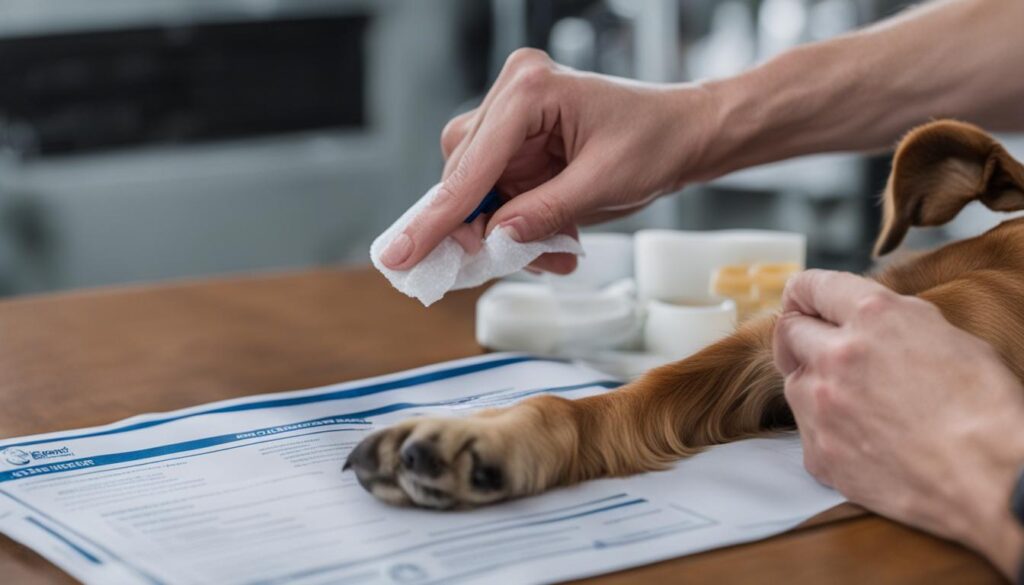As a dog owner, you want your furry friend to be healthy and happy. Unfortunately, dogs can suffer from a variety of skin problems that can cause discomfort and even lead to serious health issues if left untreated. It is essential to understand the common skin problems that dogs can experience and know how to identify and manage them effectively.
Some of the most common skin problems in dogs include allergies, infections, hot spots, and dermatitis. Understanding the signs and symptoms of these conditions is crucial for early detection and treatment.
If you notice any changes in your dog’s skin, such as redness, itching, or rashes, it is essential to take appropriate measures to address the underlying issue. With proper care, you can help your dog maintain healthy skin and overall well-being.
Key Takeaways:
- Skin problems in dogs are common and can cause discomfort for your furry friend.
- Common skin problems include allergies, infections, hot spots, and dermatitis.
- Early detection and treatment of skin issues is crucial for your dog’s well-being.
- Proper care and prevention techniques can help minimize the risk of skin problems in dogs .
- If you notice any changes in your dog’s skin, it is important to seek veterinary care if needed.
Signs of Skin Problems in Dogs
As a pet owner, it’s important to keep an eye out for signs that your dog may be experiencing skin problems. Some common symptoms to look out for include:
- Excessive itching or scratching
- Redness or irritation of the skin
- Bumps, rashes, or scabs on the skin
- Hair loss or bald patches
- Foul odor coming from the skin
If you notice any of these symptoms in your dog, it’s important to take action and seek treatment to address the underlying issue. But what are some of the possible causes of these symptoms?
One common culprit of skin problems in dogs is itching. Itching can be caused by a variety of factors such as fleas or other parasites, allergies, skin infections, or dry skin. In some cases, your dog may develop a skin rash as a result of excessive scratching or rubbing against surfaces.
Another potential cause of skin problems in dogs is allergies. Dogs can be allergic to a variety of substances such as certain foods or ingredients in their food, plants, and environmental allergens like pollen or dust mites. Allergies can cause itching, redness, and other symptoms of skin problems in dogs.
Identifying the Cause of Skin Problems in Dogs
Pinpointing the cause of your dog’s skin problems is crucial for effective treatment. Your veterinarian can help you identify the underlying cause by conducting a physical examination, skin tests, or blood tests. In some cases, they may refer you to a veterinary dermatologist for further testing and treatment.
If the cause of your dog’s skin problems is determined to be allergies, your veterinarian may recommend an elimination diet or allergy testing to identify the specific allergen. They may also prescribe medication such as antihistamines, steroids, or immunotherapy to manage your dog’s symptoms.
Overall, being vigilant and familiar with the signs of skin problems in dogs is key to identifying and addressing issues promptly. With proper diagnosis and treatment, you can help your furry friend achieve healthy, comfortable skin.


Common Skin Problems in Dogs
Dogs can suffer from a range of skin problems that can cause discomfort, itchiness, and pain. These skin issues can be caused by a variety of factors, including allergic reactions, infections, and parasites.
It is important to identify the specific skin condition that your dog is experiencing in order to properly manage it. Here are some common skin problems in dogs:
| Condition | Description |
|---|---|
| Allergies | Allergies are one of the most common causes of skin problems in dogs. They can be caused by a variety of factors such as food, fleas or environmental irritants. |
| Dermatitis | Dermatitis is a general term for inflammation of the skin. It can be caused by allergies, parasites or infections. |
| Hot Spots | Hot spots are red, moist, and often-painful lesions that develop on the skin. They can be caused by a variety of factors, including allergies, parasites or excessive licking or scratching of the skin. |
| Dry Skin | Dry skin is a common condition that can cause flaky or cracked skin in dogs. It can be caused by a variety of factors, including dry air, poor nutrition, or over-bathing. |
| Infections | Skin infections can be caused by bacteria, fungi, or yeast. They can be itchy, painful and cause hair loss. Some dogs are more predisposed to skin infections due to their breed, age, or other underlying medical conditions. |
If you suspect that your dog is suffering from any of these skin problems, it is important to consult your veterinarian for proper diagnosis and treatment. Some of these conditions may require prescription medication to effectively manage them.
Allergic Skin Reactions in Dogs
If your furry friend is experiencing skin problems, it may be due to an allergic reaction. Allergies can be caused by a variety of factors, including food, pollen, mold, and flea bites. Identifying the source of the allergy is crucial in successfully treating the condition.
Food allergies are one of the most common causes of skin problems in dogs. Certain ingredients in your dog’s diet can trigger an allergic reaction, resulting in itching, redness, and inflammation. To diagnose a food allergy, your veterinarian may recommend an elimination diet, where certain foods are removed from your dog’s diet to determine the allergen.
Environmental allergies, such as pollen and mold, can also cause skin problems in dogs. These allergies are typically seasonal, meaning they occur at specific times of the year. Symptoms of environmental allergies include itching, redness, and rashes.
Flea allergies are another common cause of skin problems in dogs. When a dog is allergic to flea bites, even a single bite can cause intense itching and discomfort. Regular flea prevention is key in managing flea allergies in dogs.
If you suspect that your dog is suffering from an allergic reaction, it is important to seek veterinary care. Your veterinarian can help to identify the source of the allergy and recommend appropriate treatment options.


“Allergies are a common cause of skin problems in dogs. We will explore different types of allergies, including food allergies, environmental allergies, and flea allergies.”
Treating Dog Skin Problems
There are various treatment options available for managing skin problems in dogs. Treatment will vary depending on the underlying cause of the condition. For example, if your dog is experiencing itching and redness due to an allergic reaction, your veterinarian may recommend antihistamines or steroids to alleviate symptoms.
Additionally, proper grooming and skin care can help to reduce the risk of skin problems in dogs. Regular brushing and bathing can help to remove dirt, debris, and allergens from your dog’s coat, preventing irritation and inflammation. Moisturizing shampoos and conditioners can also help to soothe dry, itchy skin.
If your dog’s skin condition is severe or does not improve with treatment, your veterinarian may recommend further testing, such as skin biopsies or blood work, to determine the underlying cause of the issue.
Managing Dog Skin Problems
If your dog is experiencing skin problems, there are various approaches you can take to manage and treat the issue. Below, we will explore some options for treating skin problems in dogs:
Veterinary Treatments
If your dog’s skin problem is severe or persistent, you may need to seek veterinary care. Your vet can offer a variety of treatments, such as medications, topical creams, and allergy shots. Be sure to follow your vet’s instructions carefully to ensure the best outcome for your dog.
Proper Grooming Techniques
Regular grooming can go a long way in preventing and treating skin problems in dogs. Brushing your dog’s fur helps to distribute oils throughout their coat, which can prevent dry skin. Bathing your dog with a gentle, moisturizing shampoo can also help to soothe dry skin and remove allergens. Additionally, keeping your dog’s nails trimmed can prevent them from scratching and irritating their skin.
Dietary Adjustments
Your dog’s diet can also play a role in their skin health. Ensuring that they have a balanced diet with high-quality ingredients can help to support healthy skin. Additionally, some dogs may benefit from a diet that is designed to address specific skin problems, such as allergies or dry skin.
Home Remedies
There are a variety of natural remedies that can help to alleviate skin problems in dogs. Some options include coconut oil, oatmeal baths, and apple cider vinegar rinses. However, it is important to remember that not all home remedies are safe for dogs, so be sure to do your research and consult with your vet before trying any new treatments.
By taking a proactive approach to managing your dog’s skin problems, you can help to alleviate discomfort and promote healthy skin. Remember to be patient and consistent in your approach, and don’t hesitate to seek veterinary care if necessary.


Preventing Skin Problems in Dogs
Preventing skin problems is an essential part of dog skin care. Here are some tips to keep your dog’s skin healthy and prevent common skin problems:
- Regular bathing: Regular baths help remove dirt and bacteria from your dog’s skin and coat. However, avoid over-bathing as it can strip away natural oils and cause dryness. Bathing once a month is usually enough for most dogs.
- Flea control: Fleas are a common cause of skin irritation and itchiness in dogs. Use flea preventatives and keep your dog away from infested areas to avoid flea bites.
- Proper nutrition: A balanced diet that includes all the necessary vitamins and minerals is crucial for maintaining healthy skin and coat. Consult with your vet to ensure your dog is getting the right nutrition.
- Avoid allergens: If your dog is allergic to certain foods, pollen, or dust, try to avoid exposure to those allergens as much as possible.
By following these simple steps, you can minimize the risk of skin problems in your dog and keep your furry friend healthy and happy.


When to Seek Veterinary Care
While some skin problems in dogs can be managed at home, others may require professional veterinary care. As a responsible pet owner, it is crucial to recognize the warning signs that indicate it is time to seek medical attention.
If your dog is experiencing the following symptoms, it is recommended to consult with a veterinarian:
- Severe itching or scratching
- Intense redness or swelling
- Open sores or wounds
- Bleeding or oozing from the skin
- Signs of infection, such as discharge or bad odor
Additionally, if your dog is exhibiting other behavioral changes, such as lethargy or loss of appetite, it may indicate an underlying health issue that requires medical attention.
When you visit a veterinarian, they will likely perform a physical exam and possibly recommend further tests, such as skin scrapings or blood work, to diagnose and treat the underlying problem.
Remember, prompt veterinary care is essential for successfully treating most dog dermatological problems.


Conclusion
Caring for your dog’s skin is an essential part of their overall health and happiness. By learning to recognize the signs of common skin problems in dogs, you can take action to address them early on and prevent them from becoming more severe.
Keep Your Dog Healthy
To keep your dog’s skin healthy, it’s important to maintain a regular grooming routine, including weekly baths, brushing, and nail trims. In addition, providing your dog with a healthy diet and regular exercise can help prevent many skin problems.
Consult with Your Veterinarian
If your dog is experiencing skin problems that are persistent or severe, it’s important to consult with your veterinarian to determine the underlying cause and the best course of treatment. Your vet may recommend medication, topical treatments, or changes in diet or lifestyle to eliminate the issue.
Implement Preventative Measures
Preventing skin problems in dogs is always better than having to treat them. Regular flea control, avoiding allergens, and providing a healthy diet and exercise routine are great ways to keep your dog’s skin healthy and free from problems.
Remember, your dog relies on you to keep them healthy and happy. By staying informed about common skin problems in dogs and taking the necessary steps to prevent and treat them, you can ensure that your furry friend remains by your side for years to come.
FAQ
What are the common signs of skin problems in dogs?
Common signs of skin problems in dogs include itching, redness, rashes, hair loss, dry skin, and sores.
What are some common skin problems in dogs?
Dogs can suffer from allergies, dermatitis, hot spots, dry skin, and infections.
How can I identify allergic skin reactions in my dog?
Allergic skin reactions in dogs can manifest as itching, redness, hives, swelling, and hair loss. It is important to consult a veterinarian for a proper diagnosis.
How can I manage dog skin problems?
Managing dog skin problems involves veterinary treatments, proper grooming techniques, dietary adjustments, and the use of home remedies to alleviate discomfort and promote healthy skin.
What can I do to prevent skin problems in my dog?
Preventive measures for skin problems in dogs include regular bathing, flea control, proper nutrition, and avoiding allergens.
When should I seek veterinary care for my dog’s skin problems?
If your dog’s skin problem persists, worsens, or is accompanied by other concerning symptoms, it is recommended to seek veterinary care for proper diagnosis and treatment.

